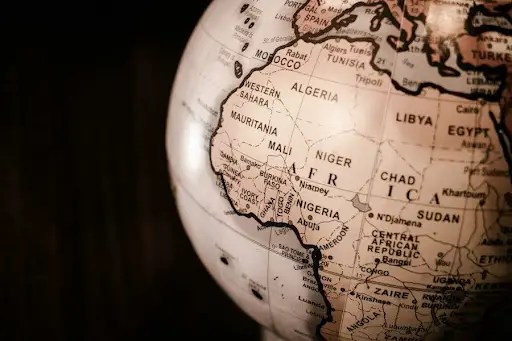
[ad_1]
One thing that has been consistent when it comes to crypto use around the world is that the popularity of these digital assets is not uniform. While some countries have been enthusiastic about welcoming crypto, others have been hostile.
The same is true even with Africa. You’d only need to take a look at the list of African countries that banned cryptocurrency. But with a large young population that has proven to be tech-froward, the continent seems ripe for a crypto revolution. As 2024 shapes up, certain countries in Africa have been especially notable for leading the crypto charge.
- Nigeria
As the most populous black nation with a significant chunk of its people under 35, Nigeria was already poised to be a crypto leader on the continent. As crypto became more popular globally, many Nigerians embraced it for cross-border transactions, speculative trading, and so on.
Over time, the country has found itself as the home of several notable crypto companies like Finna Protocol and Coinazer. The industry ran into some roadblocks after a controversial decision by its Central Bank deemed crypto transactions illegal. However, this law was repealed in December 2023, right when the industry was prepping for a bull run. With the progress that crypto at large is looking to see in 2024, we can expect adoption rates to go up.

The country is also home to some of the top blockchain companies in Africa that offer a variety of services. There are mining operations, wallet providers, gambling sites such as the best crash gambling sites, and more.
Also encouraging is the fact that Nigeria was ranked second in the Chainalysis global crypto adoption index for 2023, right behind India. Another notable crypto development within Nigeria was the release of its CBDC the eNaira which, while it did not become one of the top African cryptocurrencies, showed that digital assets could be embraced on a federal level.
2024 is looking to be a big year for the industry and considering how much the crypto industry has thrived in Nigeria thus far, it should retain its place as a force.
- Kenya
Kenya stands out in the discussion about African crypto adoption for a number of reasons. First, the country has been very enthusiastic about embracing crypto use. According to current data, 4.25 million Kenyans currently hold cryptocurrency and this represents 8.5% of the population. This level of adoption has proven to be very profitable for the crypto market in Kenya as revenue rates are pegged to hit $19.2 million in 2024.
A driving factor for this adoption is the financial inclusion that it offers Kenyans. Many Kenyans, especially those living in more rural areas, are excluded from the traditional financial system. Cryptocurrency, in some way, gives them a way to access financial services with fewer barriers.
The government, on its part, has responded to the growing use of crypto by creating more regulations. While the Central Bank of Kenya declined to develop a CBDC claiming that it is not compelling enough, the government has approached the Blockchain Association of Kenya to create a first draft of a crypto bill.
As 2024 unfolds, we can expect crypto to not only be more widely used in Kenya but better regulated as well.
- South Africa
The last year has seen South Africa’s relationship with crypto evolve significantly. First, there are the impressive South Africa crypto adoption rates. The country is ranked second only to Nigeria when it comes to crypto adoption on the continent. It has been estimated that 5.8 million people in South Africa own cryptocurrency, which is 9.44% of the population. Thanks to this enthusiasm regarding cryptocurrency, many South African-based businesses like Paycorp and Stitch have released products and services that allow South Africans to withdraw crypto and pay with them.
As the business angle of crypto has been booming in the country, regulations are fast catching up with it. Last year, South Africa’s Financial Sector Conduct Authority (FSCA) announced that crypto companies would need to apply for a license if they want to operate. Some welcomed this as a way to regularise the industry while others were concerned about the impact this requirement would have on smaller crypto businesses. According to a December 2023 report, the FSCA had received over 128 applications and had approved 36 of those firms. 2024 should see South African crypto companies become more properly regulated even as their customer bases grow.
- Ghana
While it is still behind its counterparts like Nigeria and South Africa, 2024 is shaping up to be a big year for the Ghanaian crypto scene. As per a report from Chainalysis, the country is ranked 5th in Africa when it comes to crypto adoption. This, it says, will only be increased by the country’s remarkably high inflation levels, which usually leads to citizens turning to digital assets as a hedge. Besides these, the country has a young and tech-forward population, which has created an environment for crypto businesses to thrive.
Like other countries, the government of Ghana has had to catch up to crypto developments and better regulate the industry. In 2023, the government set up a task force to not only monitor the happenings in the crypto sector but also to increase trust among crypto owners in the Ghanaian Securities and Exchange Commission. All these come at a time when the crypto industry is gearing up for a year of bull runs and greater public visibility. Should the stars align and the crypto-centric crowd in Ghana maintain their enthusiasm, the country could not only perform as well as its counterparts on the continent but could be a bonafide crypto leader in 2024.
Conclusion
2024 will likely be an exciting year for crypto overall, including in Africa. As digital assets are becoming more popular across the continent, certain countries are emerging as leaders of the movement. From Nigeria to South Africa, these countries are seeing adoption rates that exceed expectations, innovations within business and growing regulatory support.
Over time, we can expect these countries to make headlines throughout 2024 and beyond.
[ad_2]
Ghananewshome





